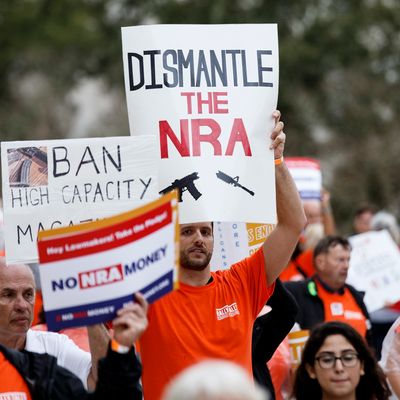
On the morning a psychopath with 24 semiautomatic rifles murdered 58 people in Las Vegas, Nevada, last fall, the Democratic Congressional Campaign Committee sent its candidates a stern warning: Now was not the time to talk about gun violence.
“You and your candidate will be understandably outraged and upset, as will your community. However, DO NOT POLITICIZE IT TODAY,” the DCCC regional press secretary Evan Lukaske instructed candidates in the Northeast, in an email obtained by the Huffington Post. “There will be time for politics and policy discussion, but any message today should be on offering thoughts/prayers for victims and their families, and thanking 1st responders who saved lives.”
This was just one missive from a single DCCC employee. But it reflected a broader fear among Democratic operatives that the party had little to gain — and much to lose — from a renewed debate over gun control. And this assessment was understandable: The chances of passing meaningful gun reform with Trump in the White House looked to be roughly 0 percent; meanwhile, for Democrats to keep their red-state senators — and reclaim purple-state governorships — in 2018, they would need to over-perform in rural America, where NRA members disproportionately live. So why start a losing fight on guns, the logic goes, when you could keep the focus on health care and Donald Trump’s myriad affronts to common decency?
But the survivors of the Parkland massacre don’t take their talking points from the DCCC. And they wasted no time before politicizing their (inherently political) tragedy. The theater kids of Marjory Stoneman Douglas didn’t lace their appeals for gun reform with pieties about the Second Amendment, but with diatribes against the NRA’s blood money. They didn’t stick to poll-tested prescriptions like universal background checks (with no enforcement mechanism); they heartily applauded a ban on all semiautomatic weapons. In short: They did exactly what the DCCC begged its candidates not to do.
And they’re winning. As the New York Times reports:
In Minnesota, a Democratic candidate for governor with rural roots is running from his past affiliation with the National Rifle Association. In South Florida, endangered House Republicans are embracing an assault weapons ban. In Ohio, the moderate Democratic candidate for governor, feeling heat from his left, is embracing a more stringent gun-violence platform than his past relations with the N.R.A. would suggest.
… On the Republican side, Gov. Bill Haslam of Tennessee, who runs the Republican Governors Association but does not have to run again, gave his party a blunt warning about the political challenge staring it in the face: voters “particularly among suburban women,” are mobilizing for gun control.
“When you have something put into stark dramatization like Florida, than I think that gets people’s attention. And they say, ‘there’s got to be certain things we can do,’” said Mr. Haslam, who called for raising the age limit on gun purchases over the N.R.A.’s opposition.
A Southern GOP governor is warning his party that Republicans are on the wrong side of the gun issue. This is what it sounds like when the tectonic plates beneath American politics shift.
Over the past two weeks, polls have registered a significant, leftward swing in public opinion on gun control — one that has almost certainly been engineered by the Parkland students’ activism. But the concern among (some) Republican candidates and operatives isn’t exclusively a reaction to the shift in public opinion — universal background checks have boasted upwards of 90 percent support for years, and the GOP has blithely opposed them nonetheless.
The other critical factor, as Haslam suggests, is the centrality of the suburbs to the 2018 midterms. Once a reliable bastion of Republican politics, suburban areas have been moving leftward for decades — and the Trump-Clinton race accelerated that long-term trend. Now, the Democratic Party’s path back to a House majority runs through historically Republican suburban districts that split their tickets in 2016.
What’s more, as Laura Putnam and Theda Skocpol demonstrate in Democracy Journal, suburban women in middle America have been the core of the Democratic resistance to Trump — they have made up the bulk of the organizers who are revitalizing state parties and winning special elections from coast to coast.
For decades, Democratic strategists have seen gun control as an issue that could help the party make inroads with suburban voters. The convergence of a galvanizing national tragedy and protest movement — with a midterm environment that gives disproportionate voice and influence to suburban voters — has made this a uniquely bad time for the Republican Party to perform its fealty to the NRA. And yet, many GOP candidates have been forced to do exactly that. On Monday, the Republican front-runner in Georgia’s governor’s race vowed to block a tax cut for Delta Airlines, unless the company restored discounts for NRA members — signaling that he’s willing to put the ambitions of far-right activists over both the concerns of suburban moderates, and the needs of Atlanta’s business community.
Thus, most Democratic House candidates would do well to “politicize” the gun issue. As political analyst Sean McElwee, using regression modeling to extrapolate district-level political opinion from national survey data, finds:
[I]n the average DCCC target district, support for closing the gun show loophole (‘background checks for all sales, including at gun shows and over the internet’ is how the question is worded) is a whopping 88 percent; support for an assault weapon ban (“ban assault weapons”) is 61 percent.
To be sure, Democrats still face some risks in elevating the salience of gun policy, especially in a few of the Senate’s key battlegrounds. But all things considered, Team Blue has rarely had more to gain — and less to lose — by bringing progressive values to a gun fight.






























